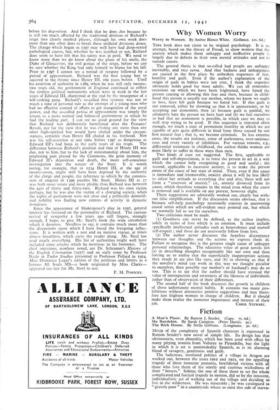Why Women Worry Worry In Women. By Amber Blanco White.
(Gollancz. 12S. 6d.) THIS book does not claim to be original psychology. It is an attempt, based on the theory of Freud, to show women that the anxiety which makes them unhappy and ineffective people is largely due to defects in their own mental attitudes and not to outside causes.
The general thesis is that so-called bad people are unhappy inevitably, and vice versa. And that badness and unhappiness are caused in the first place by unbroken sequences of fear, hostility and guilt. Even if the author's explanation of the origin of guilt in babies were not true, I think the sequence obviously holds good for most adults. We can all remember occasions on which we have been frightened, have hated the person causing or allowing this fear and then, because in child- hood this person is usually our mother, whom we know we ought to love, have felt guilt because we hated her. If this guilt is not removed, either by showing us that it is unnecessary, or by accepting our atonement, then (a) because guilt is painful, we ultimately hate the person we have hurt and (b) we feel ourselves so bad that no atonement is possible, in which case we may as well stop trying to be good. If this sequence is repeated often enough, we reach a state of permanent hostility in which we are capable of acts quite different in kind from those caused by our first natural fear ; that is, we become criminals. In less extreme cases, the results are jealousy, sense of uselessness, over-anxious- ness and every variety of inhibition. For various reasons, e.g., differential treatment in childhood, the author thinks women are more likely to suffer in these ways than men.
Two kinds of cure are suggested. The first, applicable to guilt and self-depreciation, is to force the person to act in a way which she cannot help recognising as good and useful ; the second, applicable to excessive anxiety, is to make the person aware of the cause of her state of mind. Then, even if this cause is immediate and irremovable, anxiety about it will be less likely to infect her attitude to everything else and also,°there will not form a " reservoir of anxiety," i.e., anxiety divorced from its cause, which therefore remains in the mind even when the cause is removed and is available on any pretext, however slight. These suggestions are admirably worked out, clearly but with- out false simplification. If the discussion seems obvious, that is because self-help psychology necessarily consists in uncovering causal series which are self-evident once pointed out, but which we normally fail to see for ourselves.
Two criticisms must be made.
(i) Goodness can never be defined, as the author implies, solely in terms of love which is an emotion. It must include specifically intellectual attitudes such as benevolence and mutual self-respect ; and these do not necessarily follow from love. (2) The author never discusses the hopeless discrepancy between our thoughts and the actions we express them in. Failure to recognise this is the greatest single cause of unhappy personal relationships. The educative value of good novels lies (a) in describing thoughts recognisably like our own and then forcing us to realise that the superficially inappropriate actions they result in are also like ours, and (b) in showing us that if the novelist's mind can work in this way we thought peculiar to ourselves, then possibly our mother's or husband's may do so too. This is to say that the author should have stressed the value of introspection and awareness of the likeness of individuals rather than of observation of their differences.
The second half of the book discusses the growth in children of those unfortunate mental habits. It contains too many pro- hibitions without alternative positive suggestions and may there- fore just frighten women in charge of children. But it should make them realise the immense importance and interest of their


























 Previous page
Previous page